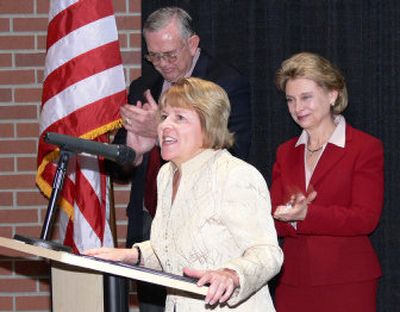Governor seeks boost in medical training

Pledging to boost rural health care, Gov. Chris Gregoire on Thursday said she wants to expand Spokane-area training programs for first-year medical and dental students, as well as a nursing doctoral program in Spokane.
“This is a cost-effective, common-sense way to address significant shortages of health care professionals in our state,” Gregoire said.
The governor made her announcement flanked by Washington State University President V. Lane Rawlins, University of Washington President Mark A. Emmert, Eastern Washington University President Adolopho Arevalo, Community Colleges of Spokane Chancellor Gary Livingston and state Senate Majority Leader Lisa Brown, D-Spokane.
“We’re thrilled to be a part of this,” Emmert said.
Brown said she expects some opposition from the Legislature on spending the cash, about $25 million by some estimates, needed to get such a program up and running in Spokane.
“But compare that to the alternative of starting a whole new medical school or dental school,” she said.
At a Senate hearing in Spokane in September, some lawmakers seemed startled at the price tag. Some wondered if the money would be put to better use expanding the University of Washington’s existing medical school in Seattle.
No figures were immediately available. Gregoire’s announcement in Spokane was one of several previews of her 2007-09 budget proposal, which she’ll unveil next week.
The Spokane Regional Chamber of Commerce is calling for a $25 million effort, enough to launch a program starting with 20 medical students, eight dental students and 15 doctoral nursing students per year.
Gregoire also said she wants to add 20 master’s-level nursing students and 30 nursing undergraduates in Spokane.
Much of the cost would be construction money. Washington State University’s Larry Ganders said the actual operating cost would be about $15 million.
“This is very good news. We don’t yet have the budget to look at, but obviously the governor is making the commitment,” said Ganders.
Spokane-area lawmakers worked hard to get the issue on the governor’s radar, he said.
“Some people think that because these programs are so expensive, it’s OK that our doctors and dentists are being educated in other states and countries,” Ganders said. “But it’s less OK if you’re the parent of someone who wants to be a doctor or dentist.”
University officials have repeatedly told lawmakers that studies suggest that medical students tend to stay in the area where they go to medical school.
Gregoire will ask lawmakers – who write the state’s two-year budget – to expand the WWAMI medical program to Washington State University’s Riverpoint campus in Spokane. Under the existing program, medical students from Washington, Wyoming, Alaska, Montana and Idaho train under the auspices of the University of Washington’s medical school.
Launched in 1972, the WWAMI program accepts students from each of the states as University of Washington medical students.
They typically study for the first year locally – the University of Idaho and WSU, for example, teach a combined 38 students – then travel to UW’s medical school in Seattle for second-year teaching. The students’ third and fourth years consist of clinical work, which can be done in the five participating states.
“The program has a 35-year track record of training students to practice in underserved areas of the state,” Gregoire said, “and under my proposal, we will bring this successful program to Spokane.”
She also wants to launch a new dental education network at WSU Spokane and to expand the existing WSU-led Intercollegiate College of Nursing in Spokane, allowing for more nursing students and a new doctoral program.
Gregoire is also proposing expanding the UW schools of medicine and dentistry.
Eastern Dental Hygiene Department Chair Rebecca Stolberg said the governor’s proposal would not just increase the number of dentists training in Washington, but would allow them to learn alongside their future co-workers.
“We typically train the dental team members in isolation,” she said. “This will allow interaction between the dental and the hygiene students.”
In other higher-education proposals, the governor also wants to:
“Freeze tuition at community and technical colleges for the next two years;
“Limit annual tuition increases at WSU and UW to a maximum of 7 percent a year, and a maximum of 5 percent at the state’s other four-year schools;
“And add 3,300 new high-demand slots for students at the state’s colleges, out of a total of 8,300 additional spots.
Emmert said UW is happy with the proposed tuition caps.
“What we have wanted all along is exactly what the governor has proposed,” he said.
Gregoire said that to put the caps into place, the Legislature will have to be prepared to provide significant funding to keep the universities competitive.
State Sen. Mark Schoesler, R-Ritzville, said the governor’s WWAMI proposal enjoys bipartisan support regionally but may run into opposition from Western Washington legislators.
“Regional programs are very popular with some of the shortages we face in the medical professions,” he said.
Schoesler added that he felt the program has a better chance of obtaining legislative approval as it is included in the governor’s budget proposals.
Where he differs with the governor is the tuition caps. Schoesler said the caps are too high and would make saving for college more difficult for middle-income families.
“The sad part is, if you get a 3 percent pay raise and tuition goes up at 5 or 7, the gap continues to broaden,” he said.
Schoesler said he will support the tuition freeze at community and technical colleges.
Gregoire also proposed bolstering small businesses around the state by training workers through Regional Opportunities Grants. She said information on businesses’ needs would be evaluated and tuition grants would be created for community colleges and technical schools in their area that reflected those needs.